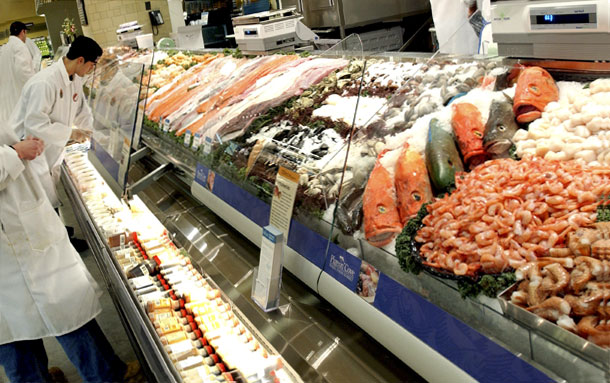A Very Bad Report Card
When your kid consistently gets Fs, then the occasional F+ looks great.
That was my feeling today when Greenpeace released its rankings of 20 large United States grocery retailers in terms of seafood sustainability.
Whole Foods Market, Ahold USA, Harris Teeter, Wegmans, Wal-Mart, and Target were rated best by the environmental group. The best of a bad lot, that is—they all flunked badly, scoring 4 or 3 out of a possible 10.
But they shone in comparison to most stores. Fully half of the surveyed supermarkets tied for dead last, earning a score of 1 out of 10. The rogues’ gallery included Winn-Dixie, A&P, Supervalu, Price Chopper, Publix, and (this caught me by surprise) Trader Joe’s.
Greenpeace says that the report provides stores with information to help them improve sustainability. But the National Fisheries Institute (NFI), a trade group representing sellers of seafood, lambasted the list, describing it as “another example of Greenpeace’s failure to responsibly engage the seafood community,” and using such terms as “erroneous,” “alarmist,” “no credibility,” and “non-science based” [sic]. It also warned grocery stores to be “prepared for direct action by Greenpeace activists.”
Greenpeace says it did hold discussions with retailers, and although I find most of NFI’s complaints about the report to be self-serving, it may be right about those activists. In Britain, where Greenpeace has had a similar rankings system in place for two years, demonstrators picketed the grocery chain with the lowest score. Its response was to take steps to clean up its act.
If you want to see how stores in your state stacked up, you can go to Greenpeace’s interactive Website. Just be prepared to tell your local grocer that you are taking away your business until those grades go up.
The Whole Truth
After being effectively muzzled for nearly a year while the Securities and Exchange Commission investigated postings he put up on the internet, John Mackey, the loquacious CEO of Whole Foods Markets, was exonerated last month. He had a lot to get off his chest.
And get it off he did last week in a terrific interview with Samuel Fromartz, a business reporter and food writer (and sometime Gourmet contributor) who authored Organic, Inc., an examination of the industrialization of natural foods.
Revealing tidbits dished up by Mackey:
· If he could go back in time, Mackey would not have acquired competing natural foods chain Wild Oats—too many legal and bureaucratic entanglements and tens of millions of dollars in associated fees.
· Sales gains are in decline—Mackey says high gas prices mean customers won’t go that extra mile to get to his stores.
· Whole Foods stock has fallen by 65 percent in the last two years.
· Mackey admits that the company has not done enough to make its seafood section more sustainable—“I am very frustrated,” he said.
But enough of that. Whether you shop at Whole Foods or not, you owe it to yourself to read the interview in its candid entirety.




 Pinterest
Pinterest


